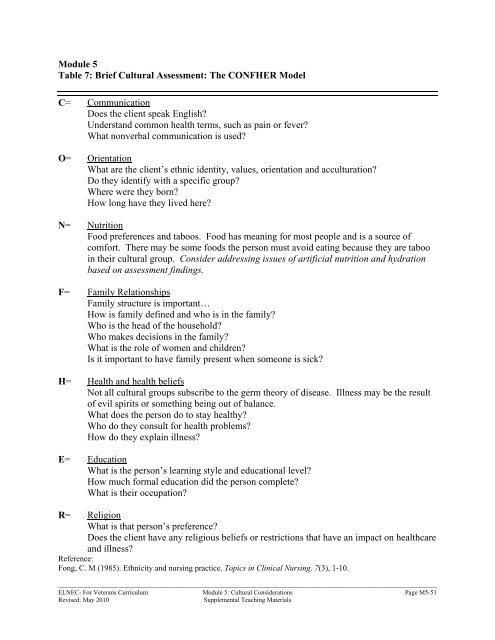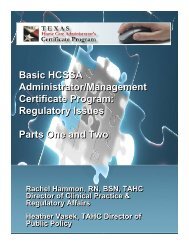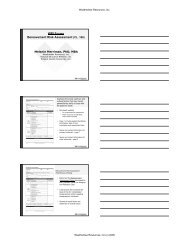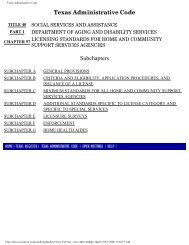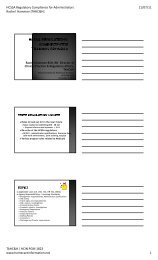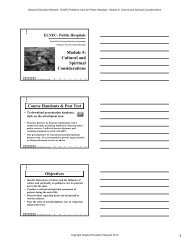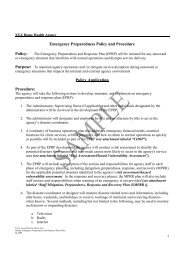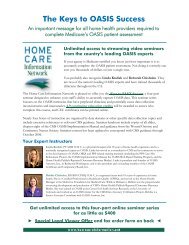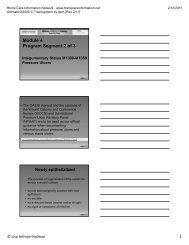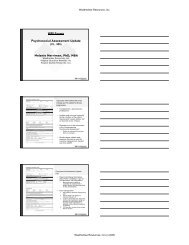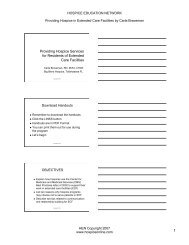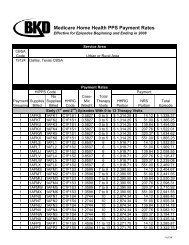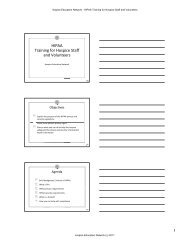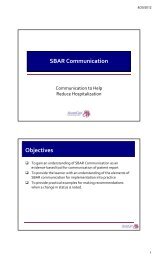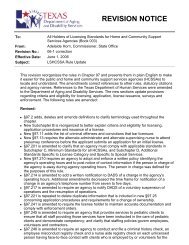Module 5 Table 7: Brief Cultural Assessment: The CONFHER Model ...
Module 5 Table 7: Brief Cultural Assessment: The CONFHER Model ...
Module 5 Table 7: Brief Cultural Assessment: The CONFHER Model ...
- No tags were found...
You also want an ePaper? Increase the reach of your titles
YUMPU automatically turns print PDFs into web optimized ePapers that Google loves.
<strong>Module</strong> 5<strong>Table</strong> 7: <strong>Brief</strong> <strong>Cultural</strong> <strong>Assessment</strong>: <strong>The</strong> <strong>CONFHER</strong> <strong>Model</strong>C= CommunicationDoes the client speak English?Understand common health terms, such as pain or fever?What nonverbal communication is used?O= OrientationWhat are the client’s ethnic identity, values, orientation and acculturation?Do they identify with a specific group?Where were they born?How long have they lived here?N= NutritionFood preferences and taboos. Food has meaning for most people and is a source ofcomfort. <strong>The</strong>re may be some foods the person must avoid eating because they are tabooin their cultural group. Consider addressing issues of artificial nutrition and hydrationbased on assessment findings.F= Family RelationshipsFamily structure is important…How is family defined and who is in the family?Who is the head of the household?Who makes decisions in the family?What is the role of women and children?Is it important to have family present when someone is sick?H= Health and health beliefsNot all cultural groups subscribe to the germ theory of disease. Illness may be the resultof evil spirits or something being out of balance.What does the person do to stay healthy?Who do they consult for health problems?How do they explain illness?E= EducationWhat is the person’s learning style and educational level?How much formal education did the person complete?What is their occupation?R= ReligionWhat is that person’s preference?Does the client have any religious beliefs or restrictions that have an impact on healthcareand illness?Reference:Fong, C. M (1985). Ethnicity and nursing practice. Topics in Clinical Nursing, 7(3), 1-10._____________________________________________________________________________________________________________________ELNEC- For Veterans Curriculum <strong>Module</strong> 5: <strong>Cultural</strong> Considerations Page M5-51Revised: May 2010Supplemental Teaching Materials
<strong>Module</strong> 5Figure 1: Self-<strong>Cultural</strong> <strong>Assessment</strong>1. Where were you born?If an immigrant, how long have you lived in this country?How old were you when you came to this country?Where were your grandparents born?2. What is your ethnic affiliation and how strong is your ethnic identity?3. Who are your major support people: family members, friends?Do you live in an ethnic community?4. How does your culture affect decisions regarding their medical treatment?Who makes decisions - you, your family, or a designated family member?What are the gender issues in your culture and in your family structure?5. What are your primary and secondary languages, speaking and reading ability?6. How would you characterize your nonverbal communication style?7. What is your religion, its importance in your daily life, and current practices?Is religion an important source of support and comfort?8. What are your food preferences and prohibitions?9. What is your economic situation, and is the income adequate to meet the needs of you andyour family?10. What are your health and illness beliefs and practices?11. What are your customs and beliefs around such transitions as birth, illness, and death?What are your past experiences regarding death and bereavement?How much do you and your family wish to know about the disease and prognosis?What are your beliefs about the afterlife and miracles?What are your beliefs about hope?Adapted from:Zoucha, R. (2000). <strong>The</strong> keys to culturally sensitive care. American Journal of Nursing, 100(2),24GG-24II. Reprinted with permission._____________________________________________________________________________________________________________________ELNEC- For Veterans Curriculum <strong>Module</strong> 5: <strong>Cultural</strong> Considerations Page M5-54Revised: May 2010Supplemental Teaching Materials
<strong>Module</strong> 5Figure 2: Questions for Self-Reflection1. How do you identify yourself racially, ethnically, and culturally?2. When were you first aware of your own culture?3. What is the first memory you have of someone dying in your family?4. What were the rituals, practices or behaviors that your family observed at that time?5. What aspects of your cultural background do you feel strengthen your caring for dyingpatients and their families?Source:ACCESS to End-of-Life-Care: A community initiative (2000). Trainer’s Guide (p.15)._____________________________________________________________________________________________________________________ELNEC- For Veterans Curriculum <strong>Module</strong> 5: <strong>Cultural</strong> Considerations Page M5-55Revised: May 2010Supplemental Teaching Materials


